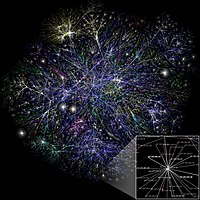
Photo from wikipedia
Multi-source information not only helps to solve the problem of sparse data but also improves recommendation performance in terms of personalization and accuracy. However, how to utilize it for facilitating… Click to show full abstract
Multi-source information not only helps to solve the problem of sparse data but also improves recommendation performance in terms of personalization and accuracy. However, how to utilize it for facilitating academic collaboration effectively has been little studied in previous studies. Traditional mechanisms such as random walk algorithms are often assumed to be static which ignores crucial features of the linkages among various nodes in multi-source information networks. Therefore, this paper builds a heterogeneous network constructed by institution network and co-author network and proposes a novel random walk model for academic collaborator recommendation. Specifically, four neighbor relationships and the corresponding similarity assessment measures are identified according to the characteristics of different relationships in the heterogeneous network. Further, an improved random walk algorithm known as “Heterogeneous Network-based Random Walk” (HNRWalker) with dynamic transition probability and a new rule for selecting candidates are proposed. According to our validation results, the proposed method performs better than the benchmarks in improving recommendation performances.
Journal Title: Scientometrics
Year Published: 2020
Link to full text (if available)
Share on Social Media: Sign Up to like & get
recommendations!